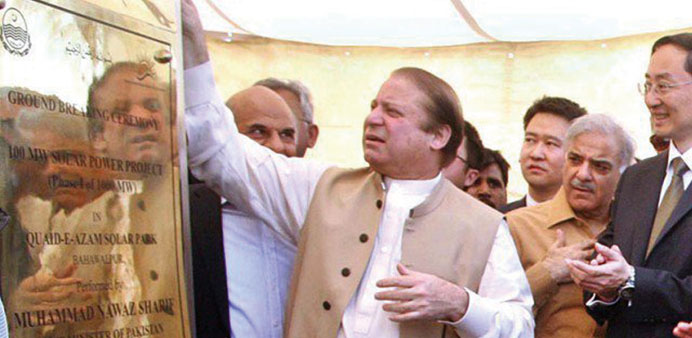Prime Minister Nawaz Sharif unveiling the plaque during the ground breaking ceremony of Quaid-e-Azam Solar Park. PICTURE: APP
Agencies/Islamabad
Pakistani Prime Minister Nawaz Sharif yesterday inaugurated the country’s first solar power plant, the latest fruit of increasingly close co-operation with China and a step towards an electoral promise to end crippling power cuts.
The solar park in Punjab province produces 100MW of power, which will be increased to 1,000MW by next year.
The plant, owned by Punjab province and built by China’s Tebian Electric Apparatus Stock Co Ltd (TBEA), took a year to build at a cost of $190mn, Pakistani government documents show.
“Since I became prime minister my one goal has been to eliminate darkness in Pakistan, and bring lights back to the country,” Sharif said in a speech.
“By 2017-2018, there will be an end to load shedding,” he said, referring to a system of rolling black-outs used to ration electricity.
The plant is the first stage of a project that will eventually cover over 10,000 acres of the central Cholistan desert and add 1,000 megawatts to the nation’s electric grid, making it one of the biggest solar parks in the world.
The country generated an average of 15,500 MW of power last year, about three-quarters of what it needs, a power ministry spokesman said. The shortfall can soar during peak summer months.
Power shortages cripple industry and have led to widespread discontent. Sharif is keen to address the problem before the next election, due by 2018.
The Quaid-e-Azam Solar Plant, spread over 500 acres of sun-baked southern Punjab, is a link in an ambitious plan for a China-Pakistan economic corridor, unveiled by China’s President Xi Jinping last month.
The corridor, linking Pakistan’s Arabian sea port of Gwadar with western China’s Xinjiang region, includes energy and infrastructure projects worth up to $46bn.
Pakistan says $37bn of Chinese investment is going into energy ventures to generate 16,400 MW of power.
Camels and horses pranced to the beat of traditional drums as national flags fluttered over the inauguration ceremony.
China’s ambassador, Sun Weidong, said the plant marked a new phase of co-operation between the neighbours.
Sharif said solar plants planned across the country would produce a total of 4,260 MW of power.
Solar and wind power is several times more expensive than electricity generated by hydropower.
Pakistan faces an annual electricity shortfall of around 4,000 megawatts in the peak summer months of June and July when temperatures can reach 50 degrees Celsius (120 Fahrenheit) in the country’s centre.

